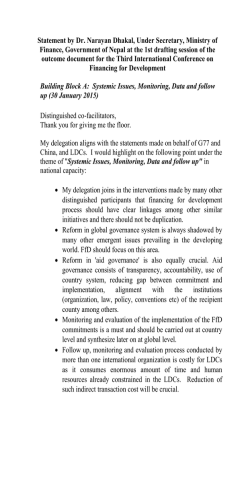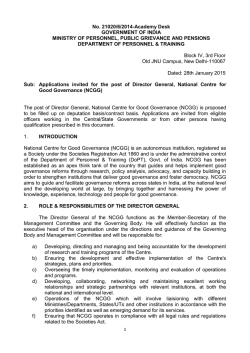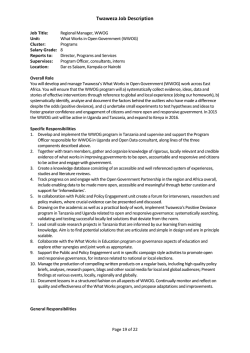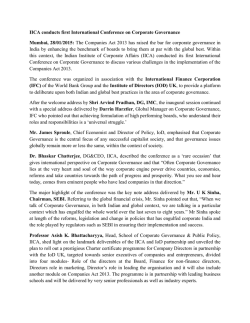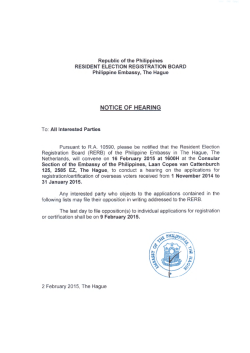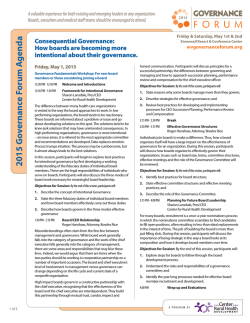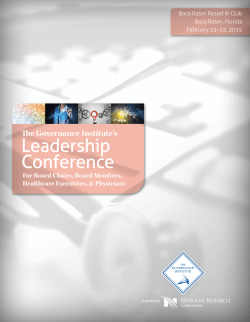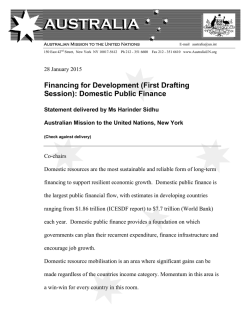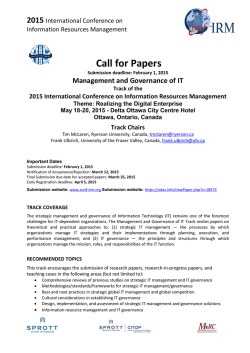
“ we believe that real development starts at a local level.”
brochure 2016 “we believe that real development starts at a local level.” The Hague Academy for local governance “It is important that communities take ownership for their welfare whenever there is a crisis.” Dear reader, Ms Clara Doe Mvogo Mayor of Monrovia As mayor of Monrovia, I was confronted with the Ebola outbreak just after my induction into office in March 2015. One of the crucial methods we used in dealing with the situation was the involvement of local community leaders. We went into the communities, spoke to block leaders, and trained them on how to inform their people regarding awareness and prevention. Our solid waste staff, community service department and environmental health department also assisted in spreading the information. I am convinced that this comprehensive, local approach is most effective in getting things done for people at all local levels in cities and villages. It is important that communities take ownership for their welfare whenever there is a crisis. As local authorities we can support them in creating structures to put forward their needs, and for them to get benefits, such as clean water, toilets and clinics. There is also the need for a good community organisation. The problem with Ebola in the beginning was that many local and international organisations were doing their own thing in the communities, without coordination. As a consequence, some areas were not receiving any help at all! We were able to inform the community leaders in all the townships of greater Monrovia that they should monitor and coordinate the support being offered to the residents. The courses of The Hague Academy for Local Governance all take this local perspective as a starting point. Both in The Hague and elsewhere, they are based on the idea that governments and citizens have to work together to plan and realize development. So if you want to expand your professional knowledge, strengthen your skills and learn from practices in other countries, take a closer look at this brochure. I am sure it will inspire you! Medical teams in Liberia work in cooperation with local leaders 2 The Hague Academy for local governance Experience, expertise And Exchange We believe that real development starts at a local level. Our programmes support people who work on strengthening service delivery, local economic development and security and rule of law. Elected representatives, civil servants and staff of NGOs and development organisations are all welcome to participate. We help them increase their capacity to jointly promote inclusive, sustainable development. Participants to the citizen participation and inclusive governance course in front of the Dutch Parliament buildings ask questions to local police officers. 4 Expertise, experience and exchange is what makes our programmes unique. We focus on real life challenges and facilitate a lively exchange of experience between colleagues. Participants discuss practical examples with internationally renowned experts and relate these to their work back home. They visit projects to learn from experiences in other countries and engage in simulations and role play to develop their skills. “We focus on real life challenges and facilitate a lively exchange of experiences.” The Hague Academy for local governance Local service delivery Decentralisation & inter-administrative relations Increase the quality of and access to services for all citizens Enhance effective cooperation between different levels of government Increase local financial capacities by fiscal arrangements and local revenue generation Human rights & the rule of law Promote access to justice and protect minorities and vulnerable groups Gender responsiveness The Hague Academy aims to strenghten Lobby & advocacy Work on gender mainstreaming and participation of women in local policies and service delivery Increase capacities to influence decision making Leadership & municipal management Local economic development Improve skills to create a shared vision, communicate with stakeholders and manage the municipal organisation Develop a LED-strategy and improve conditions for entrepreneurship and job creation Subnational conflict & peacebuilding Work on conflict prevention and social cohesion between different groups in society Multilevel water governance Citizen participation & inclusive governance Include voices of all citizens in the policy process 6 Fiscal decentralisation & local finance Disaster management & resilience Integrity & anti-corruption Build resilience and improve local response mechanisms of local authorities Promote integrity, transparency and anti-corruption measures of government institutions Create financial, legal and administrative conditions for effective cooperation in the water sector The Hague Academy for local governance This year we paid visits to: Experience • • • • • • • In our courses, we visit many local projects, municipalities, ministries and citizens’ initiatives. These visits offer the participants a closer look at the practice of local governance. They can ask questions and bring in their own experience. They will go home inspired and with many new ideas. • • • • • • • • • • • Photo Top: Project to support local entrepreneurship Photo Middle: Innovation in greenhouse agriculture Photo Bottom: Maintaining security for citizens 8 Visiting urban renewal project Ministries of Interior in The Netherlands and Morocco Ministry of Labour and Civil Service Bureau Jordan Court of Audit of The Netherlands Regional Police Haaglanden Public Prosecutor’s Office Province of South Holland Knowledge centre in glasshouse horticulture (Demokwekerij) Westland Municipalities of Amsterdam, The Hague, Rotterdam and Westland The Hague Environmental Services European Commission Brussels Anti-corruption Agency Brussels Radio Netherlands Training Institute in Hilversum House for Democracy and the Rule of Law (Prodemos) Father Centre The Hague (gender equality project) Citizen engagement projects in developing neighbourhoods Ombudsman The Hague Dutch Delta Works and Maeslantkering ‘Room for the River’-project and Dutch Water Authorities The Hague Academy for local governance Expertise Our programmes aim to strengthen local, inclusive governance in different fields of expertise. A vast network of internationally experienced experts contribute to our programmes, facilitated by our professional trainers. Experts that contribute to our courses work for a.o. the Urban Institute in Washington, the OECD, UNCDF, the World Bank, the Hague Institute for Global Justice, the Institute for Social Studies in The Hague, the University of Wageningen, the Dutch Water Governance Centre, integrity and anti-corruption institutes in The Netherlands and Brussels and many municipalities and (semi) government organisations in The Netherlands. Irma Specht Expert in social and economic development, gender and community based reintegration Aziza Akhmouch Water governance expert from OECD Alfonso García Salaues Local economic development expert Jamie Boex (Fiscal) decentralisation expert Ronald McLean-Abaroa Former mayor of La Paz, governance and anti-corruption expert Our programme managers Lars Burema and Emmely Benschop in conversation with some course participants. 10 The Hague Academy for local governance Exchange Participants to our programmes come from all parts of the world. This offers a unique opportunity to discuss challenges and solutions with colleagues from other countries. Our online network facilitates an exchange of knowledge and experiences long after the training has ended. 12 Byungdoo Lee, South Korea Head economic research team Bank of Korea Mohammad Alzawahreh, Jordan Head Local Development Unit Zarqa Municipality Akintunde Omomofe, Nigeria Head Procurement Unit Ondo State Joseph Bukari Nikpe, Ghana Member national parliament Nadia Gouta, Tunisia Head Regional Development Department Ministry of Development & International Cooperation Sanjay Gurung, United States Senior technical advisor Mercy Corps USA Matiisetso Yvonne Libetso, Lesotho Director-General Local Government Ministry of Local Government Ephenia Matebane, South Africa Monitoring and evaluation officer Rustenburg Local Municipality Narendra Bajracharya, Nepal Senior planning officer Kathmandu Metropolitan City Mary Kitegi, Kenya State counsel, Office of the Attorney General and Department of Justice Ana Sucgang, Philippines City budget officer City of San Jose Del Monte Bulaca Syimykbek Nurunbetov, Kyrgyzstan Head of division Ministry of Finance Florjan Mucaj, Albania Vice-Mayor Economic Affairs Fier Municipality Fuad Sultan Al Tamimi, Palestinian Territories Local Economic Development-expert Belgian Development Agency (BTC) Veronica Gomez, Colombia Financial and administrative coordinator ProBarranquilla Anja Hornig, Germany Consultant GFA Consulting Group Nur Syarifah, Indonesia Head of division National Development Planning Agency Cindy Joelene, Myanmar Research associate Vahu Development Institute The Hague Academy for local governance Tailor made programmes We develop tailor made programmes for capacity building of government authorities, civil society organisations, training institutes and development organisations. Thanks to our professional back office and elaborate network of trainers and experts, we are able to facilitate training in various languages, both in The Hague and in partner countries. Before the design of a training programme, a thorough needs analysis is conducted to make sure the content suits the knowledge level and training needs of the participants. Often, a train-the-trainer component is included, to help transfer the acquired knowledge to others in or outside the organisation. 14 In 2015, The Hague Academy: organised from for tailor made PROGRAMMES participants different countries The Hague Academy for local governance Biljana Tadic Working for the Basic Court Novi Sad, Serbia “I participated in the training Integrity of Civil Servants in 2014 and was recently appointed a judge. My group of training participants, is slowly, but steadily, marching towards decision making positions, ‘infected’ by integrity-awareness. Inspired by the training in The Hague, I proposed to the Dean of the University in Novi Sad where I also teach, to set up an academy of integrity. The academy should sensitise students to this crucial social value, free in expressing what kind of society they would like to live in and holding public institutions and public service representatives accountable. The Dean supports me and agreed to build up a team that will work on this. We are in the stadium of setting things up and I am very much looking forward to the start the first activities.” Photo Top: Biljana Tadic presents her back-home action plan 16 Supporting democratic transition in the Arab region Since 2012, we develop and deliver training courses for government officials from countries in the Arab region. Nearly 200 participants from Egypt, Jordan, Libya, Morocco and Tunisia followed practice oriented training in The Netherlands, Tunisia, Morocco and Jordan and engaged in online learning activities. The courses cover topics like employment policies, local economic development, social affairs, local governance and citizen participation, and are part of the democratic transition programme for the Arab region financed by the Netherlands’ Ministry of Foreign Affairs. Photo Bottom: Participants of Local Governance course are being introduced to local economic development policies and best practices of the municipality of Amsterdam. The Hague Academy for local governance Youth Engagement Programme From 2012 to 2015, The Hague Academy facilitated several leadership masterclasses and citizen participation courses as part of the Youth Engagement Programme in Burundi, Palestinian Territories and South Sudan. Programme manager Freddy Sahinguvu: “It is inspiring to see that the action plans the participants have been working on for the past three years, are showing clear progress. We are now helping the participants to sustain the results already booked”. According to the participants, the masterclasses helped to bring more focus in their actions, improved their leadership and advocacy skills and enhanced their confidence to engage in political and policy making processes. Photo Top: Participants of the Youth Engagement Programme in South Sudan discuss their advocacy strategies. 18 Leadership for Security and Rule of Law Senior civil servants from Ministries of Justice and Home Affairs, municipalities and police in Albania, Serbia and Turkey came together in Ankara in April 2015 to exchange their experiences with the Leadership programme for Security and Rule of Law. The programme increased their awareness on practices of good governance, promoting the rule of law and protecting minorities and human rights. They also strengthened their personal leadership skills. It also very much increased cooperation between Photo Bottom: Albanian participants visiting the Municipality of Diemen where the mayor is explaining the role of the municipality in local security. the different actors in the security sector. National training programmes were developed through a training of trainers component, on topics such as local leadership, integrity and anti-corruption and municipal disaster response. Moreover, concrete policy recommendations were formulated and addressed to the relevant stakeholders. A number of municipalities started pilot projects to set up local security councils inspired by Dutch best practices. The Hague Academy for local governance open courses Each year we organise open enrolment courses in the Hague. In these courses, professionals from all over the world meet each other which stimulates a lively exchange of ideas and experiences. They get acquainted with different international concepts, frameworks, tools and practices that broaden their frame of reference. Fellowships are available on a regular basis. they worked for In 2015, The Hague Academy organised open courses for: National Governments Participants from Non Governmental Organisations Different countries 20 Local Governments Donor and Development Organisations The Hague Academy for local governance Citizen Participation in Indonesia Turiyah Bakri Development officer at the department of agriculture of Parepare Municipality My expectations “In my work as a development officer at the department of agriculture of Parepare Municipality I have a lot of contact with different ethnic groups and religions. I also work closely together with local farmers who are a minority group and are often not involved in participation processes. By joining this course, I hope to get new ideas about how to change the public’s perception about minorities in their communities, how agriculture can be a part of society and bring communities together, and how local government can stimulate and develop citizen participation.” Facts Parepare Municipality Indonesia After the training “I learned that the best way to encourage citizen participation is to make citizens your partner, listen what they need, and involve them from the first instance. Furthermore, the course provided a good opportunity to learn from the other participants. The staff and facilitators were very professional. The practical and active approach in the training inspired and motivated me to contribute to the development process in my country.” Parepare is a city of 130,000 inhabitants, located on the southwest coast of Sulawesi Province in Indonesia. The province is an important cattle producing centre of the country and ParePare is known as the cattle-exporting port of the province. It is one of the major population centers of the Bugis people, the largest of the three major linguistic and ethnic groups of South Sulawesi. Members of Orang Rimba tribe discuss with local leaders what kind of services they need. Photo: Ekoningtyas Margu Wardani training Participated in training Citizen Participation and Inclusive Governance 2015. goal To learn more about how local government can stimulate and develop citizen participation. Turiyah and fellow participants visit a project in which volunteers play a vital role in the safety and welfare of their neighbourhood. 22 The Hague Academy for local governance overview open courses 2016 Local Economic Development Jan. 18-29 & Sept. 19-30 2016 This course discusses strategies and tools to manage inclusive and sustainable local economic development (LED) processes. It addresses questions such as: how to develop a joint vision for the area in a participatory manner, involving government, citizens, businesses and CSOs? How to promote job creation and entrepreneurship? How to improve conditions for business investments and small and medium enterprises? And how to finance local economic development? www.thehagueacademy.com/led Gender Mainstreaming and Service Delivery Feb. 15-19 In this course, participants explore gender aspects of governance and service delivery and discuss ways to include 2016 women’s empowerment and participation in development projects aimed at inclusive service delivery. They learn about tools for gender mainstreaming and the integration of gender in all stages of their programmes. www.thehagueacademy.com/gendermainstreaming Integrity and anti-corruption Mar. 7-18 This training focuses on the complexities of corruption, its root causes and the impact on society. The course 2016 introduces participants to different examples of institutional reforms and anti-corruption measures. Furthermore, participants discuss integrity dilemmas from their own working practice. They get familiarised with the Dutch landscape of Integrity as well as examples of policies to improve the integrity of an organisation’s workforce. www.thehagueacademy.com/integrityandanticorruption 24 Multilevel Water Governance Apr. 4-15 This course addresses the administrative, planning, financial, legal and stakeholder aspects of multilevel water 2016 governance. Participants will get a unique insight into international best practices and water governance tools and work actively to apply the five building blocks for sound water governance for their own local context. www.thehagueacademy.com/watergovernance Citizen Participation and Inclusive Governance May 23- Jun.3 This course discusses basic principles of good governance, accountability and civil participation. Participants 2016 will explore possibilities to engage citizens in the policy and decision making process with a special focus on marginalised groups. They will discuss a.o. the participation ladder, the accountability chain, do’s and don’ts in participation processes and the role of the media. www.thehagueacademy.com/citizenparticipation Summercourse: A local perspective to the Sustainable Development goals. Jul. 11-15 Key question in this course is how governments can decentralise policies and services to local levels to 2016 promote more inclusive development. Support modalities for donors are discussed as well as the political economy of decentralisation, central-local government relations and the 5C-approach to strengthen local government capacity. www.thehagueacademy.com/summercourse The Hague Academy for local governance Dr Nirmala Padmanabhan Associate professor St. Teresa’s College, Kerala India Local Service Delivery Oct. 3-14 In this course, participants learn how local governments can effectively deliver 2016 services to their citizens and how they can plan and finance it. They discuss questions such as: how can the different layers of government work together to ensure basic services also reach the poorest people? How can they set up the financial management of services in a transparent and democratic way? And how can partnerships with NGOs and the private sector help local governments to better deal with challenges in service delivery? “I participated in the training Decentralisation, Democratisation and Development in March 2013. Certain ideas I got from there stimulated me to think about gender and e-governance and I am happy to say that I was able to initiate a project ‘e-Jaalakam’ (electronic window) for promoting gender inclusion in e-governance in my state Kerala in India. www.thehagueacademy.com/localservicedelivery I am proud to say that the project won the national award on e-governance 2014-2015 by the Ministry of Personnel, Public Grievances & Pension and the Kerala Chief Ministers Award for Innovations in Public Policy in 2013. Part of the credit goes to the exposure I got at the Hague Academy of Local Governance which made me think of designing a handbook for the common man. The citizen’s handbook has increased the access to 23 core e-governance services by making them available in the local language, Malayalam. Also, more than 1500 people from around 20 civic groups have been trained, and the project has been included in the National e-Governance Plan.” Conflict, Rule of Law and Local Security Nov. 7-18 The key issues in this training are: How can governments promote citizen 2016 security and protect human rights after violent conflict? What policies and instruments do they have to foster reconciliation and peacebuilding amongst different ethnic or religious groups? And what attitude and skills do government officials need to lead conflict transformation processes? www.thehagueacademy.com/conflictandruleoflaw Dr Nirmala Padmanabhan with students of St. Teresa’s College who were part of the e-jaalakam project. Photo: The Hindu 26 The Hague Academy for local governance Integrated water management in Ethiopia tegenu tsige Adviser integrated water systems and water governance, & resident project manager My expectations “I work as resident project manager in a water governance project in Ethiopia. Different government levels are involved in this project, such as the Ministry of Water and Irrigation and the Awash Basin Authority. I wanted to participate in this training to learn more about perspectives, frameworks and approaches of water governance, and how these are applied in different countries.” After the training “This training was a real experience and opened my eyes. It simplifies my daily work by providing tools, methodologies and proven and practical experiences through case studies. The five blocks of good water governance was one of the most interesting things I learned. It really helped me to structure my thinking. In addition to that, the study visit to the regional water authority Delfland about waste water treatment, the different technologies that were presented and the cooperation with the municipality, has really inspired me.” FACTS Awash river basin Ethiopia The Awash river basin, with a total length of 1,250km, is located in central Ethiopia. It flows through five regional states and two administrative councils and is one of the most utilised rivers in the country, serving as a source of drinking water, hydropower, industrial consumption, irrigation and disposal of waste water. Dutch and Ethiopian water partners work together to establish a framework for good water governance in the basin. training Participated in training Multilevel Water Governance 2014. goals To learn more about perspectives, frameworks and approaches of water governance in order to advise partners on good water governance in the Awash basin. Tegenu receives explanation on the planning of the Dutch Delta Works. 28 The Hague Academy for local governance Talent for Governance Talent for Governance is The Hague Academy’s talent programme. We provide practice oriented learning experiences to young, talented local government practitioners and support them in implementing community projects in their home country. Talent for Governance only selects people who possess a strong motivation to make a difference for their citizens. The talent programme consists of a training course at The Hague Academy for Local Governance, an internship in a Dutch municipality and worldwide networking activities. Thereby, the young talents develop their knowledge and skills, learn from experiences elsewhere and build an international network. This helps them to deal with the challenges they face in their daily work. During the three-week programme, the talents work on the design of a project plan together with the trainers, experts and fellow participants. Back on the job they will do homework assignments and implement their project plan with the support of their employer and The Hague Academy. Talent for Governance relies on the financial support of organisations and individuals who believe in the importance of good local governance. By means of their donations, they help strengthen the capacity of villages, cities and countries to improve services for their citizens and foster sustainable economic development. Application opens once a year and for more information see www.thehagueacademy.com/talentforgovernance 30 These talents participated in our Citizen Participation and Inclusive Governance programme in June 2015. They went home with new ideas and action plans for projects that will benefit their local community. colofon Text: The Hague Academy for local Governance Photography: Rebke Klokke Concept and Design Studio Duel Printed at Oranje van Loon, The Hague The Hague Academy for Local Governance is a not-for-profit organisation based in The Hague. The Hague Academy is recognised by the Dutch tax department as an organisation that serves the general interest of society. The Hague Academy for local governance Nassaulaan 12 P.O. Box 30435 2500 GK The Hague The Netherlands T +31 (0) 70 37 38 695 F +31 (0) 70 37 38 660 www.thehagueacademy.com [email protected]
© Copyright 2026
